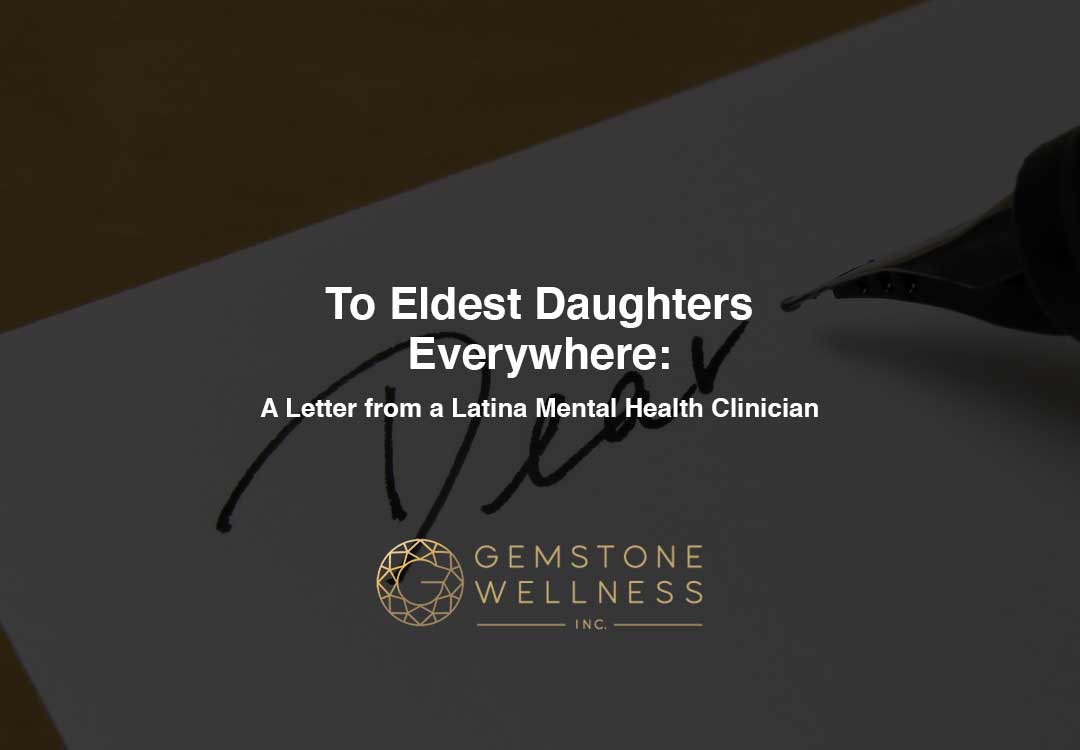Description: Eldest daughter syndrome, family dynamics, pressure, expectations, role, stress, parentification, emotional burden, self-care, caregiving, resilience
By Stephanie Hernandez, LPC
Note: Before reading this blog, please be aware that the topics discussed are deeply personal and reflect shared experiences that may not always be openly addressed. The insights and reflections shared here are intended to offer comfort, understanding, and perspective on the unique challenges faced by eldest daughters. I hope you find this read empowering and validating.
To Eldest Daughter’s Everywhere, this one’s for you:
To the daughter who had to be another mother, sister, mediator, protector, therapist, password keeper, cleaning supervisor, translator, and caregiver—(I may have missed a few others). To the parentified daughters who had to grow up too fast, to stop playing sooner to take on cooking and cleaning, who were never allowed to put themselves first, and who carried their mother’s trauma while struggling with their own. It’s about looking after everyone else but never having a moment to yourself. And let’s not forget, also being the family comedian to lighten the mood when things got intense.
This moment is for you, and I see you.
As an eldest daughter myself and a Latina mental health clinician, I want to connect with you on a deeply personal level. I understand that while our experiences may differ, the journey we share is unique. Carrying the role of the eldest daughter isn’t easy; it involves navigating a range of emotions including pressure, pride, expectation, perseverance, and a profound sense of duty. It’s like being the CEO of the family, but without the corner office – unless the laundry room counts! Acts of service often become our primary language, and we become experts at multitasking, especially when it comes to navigating family dynamics and our own lives. We hold a special place in our families, balancing high expectations with deep responsibility. In this role, we find ourselves constantly striving to fulfill our own needs while making time for others. And let’s not forget the superpower of being able to find anything in the house – who needs a GPS when you have an eldest daughter!
It’s not easy. It’s long sighs, and catching your breath. It is feeling exhausted and doing it anyway. It is not questioning the task that is given to you, it’s having a full-time job and full-time care giving. You are more than your sense of duty. You are more than the task you complete.
I want to acknowledge the unique family roles and unrealistic expectations often placed upon us. While this role may not be classified as a psychological diagnosis, it is a common concept in many collective cultures. These shared experiences are valid and deeply impactful.
Being the eldest daughter brings with it a distinct set of psychological implications shaped by family dynamics and responsibilities. Key aspects include parentification, increased responsibility, pressure, boundary issues, difficulty recognizing personal needs and expressing emotions, and hyper-independence. These significant responsibilities placed at a young age, can foster a sense of independence that could become hyper-independence, while it can be seen as a valuable trait, it can quickly become a double-edged sword with having difficulty asking for help.
Other key concepts that can also be found with eldest daughters:
- Parentification: involves a child taking on responsibilities that are usually expected of an adult, such as looking after siblings or handling family matters, which can affect their own development and emotional health.
- Emotional Expression: Concentrating on fulfilling obligations and adhering to expectations can cause a person to suppress their personal emotions. May also include having difficulty identifying one’s emotions and emotional suppression out of responsibilities.
- High-standards/Perfectionism: At times the amount of expectations and pressure can be overwhelming, it can be placed by parents or oneself, from seeking perfection and order from academic, professional, and personal achievements, which can increase feelings of self-criticism, anxiety, and low-self worth.
I understand the unique challenges that eldest daughters face—juggling so many roles and responsibilities can be incredibly overwhelming. Therapy can be a supportive space where we can address these specific struggles together. If you’re carrying the weight of being the family’s anchor and finding it hard to balance your own needs, here are some key areas where therapy can help you find clarity and relief:
- Exploring Family Dynamics: Therapy can help you understand the family patterns that shape your roles. It’s important to explore how these patterns affect your current behavior and emotional health, as this insight can lead to personal growth and positive changes.
- Addressing Parentification:It’s essential to recognize and work through the effects of parentification. Therapy can offer you a space to process your feelings about your parental roles and develop practical strategies to manage and balance these responsibilities.
- Developing Healthy Boundaries: Setting and maintaining boundaries can be challenging. Therapy can provide you with practical tools and techniques to establish and enforce healthy boundaries with family members, which is crucial for your overall well-being.
Other concepts we can explore in this space include building self-compassion, exploring self-care, and processing grief and loss. If any of these topics bring up strong emotions or concerns for you, I encourage you to seek support from a mental health professional who can offer personalized guidance and assistance. To schedule an appointment with our amazing team at Gemstone or myself, click here
So, let’s take a moment to breathe and reflect on what we’ve shared. We’ve delved into the unique struggles and triumphs of being an eldest daughter, sprinkled with humor, insight, and plenty of heart. This blog/letter is a heartfelt tribute to the heavy lifting we do daily, and a celebration of the incredible strengths that come with our roles.
This space is all about recognizing the heavy lifting we do and celebrating the strengths we bring to the table. Thank you for spending this time with me and for embracing your own journey. Your experiences are truly unique, and your resilience is something to be proud of. Together, let’s keep supporting each other and navigating this path with understanding and kindness.
Thank you for joining me in this exploration, and I hope you find the discussion both validating and empowering.
With warmth and solidarity,
Stephanie
P.S. Here are some additional resources: Sometimes it’s validating to read, watch, or listen to stories that resemble our own.
Books:
- Mother Hunger: How Adult Daughters Can Understand and Heal from Lost Nurturance, Protection and Guidance by Kelly McDaniel
- MAAME by Jessica George
- Crying in HMARTby Michelle Zauner
- Yolk by Mary Choi
- I’m not your perfect Mexican Daughter by Erika Sanchez
Movies
Podcast:

